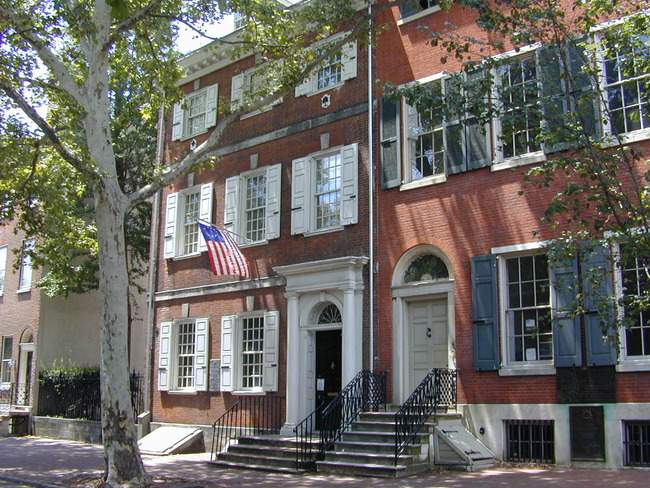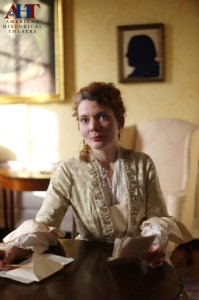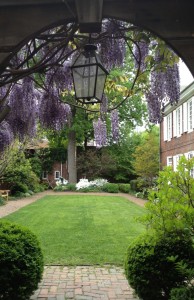
The mission of the Philadelphia Society for the Preservation of Landmarks, founded in 1931, is not only to preserve four of our city’s historic house museums, but also to engage people with history by offering related educational and cultural programming. One of the properties owned and operated by PhilaLandmarks is the Powel House, a Georgian brick mansion in Society Hill, built in 1765 and purchased four years later by Samuel Powel, mayor of Philadelphia before and after the Revolution. During its heyday, Powel and his wife Eliza (née Elizabeth Willing) entertained such notable guests at their home as George Washington, Benjamin Franklin, and the Marquis de Lafayette. But in the early 20th century, many of the architectural details of the house were dismantled and sold by the business that used it as an office and warehouse, and the gutted building, left as little more than a shell, was slated for demolition. To save the site, Frances Anne Wister founded the Philadelphia Society for the Preservation of Landmarks in order to raise the funds to purchase the Powel House and to restore it to its 18th-century glory.
Celebrating its 250th anniversary in 2015, the Powel House is hosting an array of special events in the fine and performing arts throughout the year; among the upcoming offerings are a classical music recital, theatrical productions, and painting and drawing classes. Jonathan Burton, executive director of PhilaLandmarks, explains that the diversity of art-related programming in a variety of disciplines and media is designed to attract expanded audiences—especially within the local community—and to illuminate significant aspects of the house and its period:
While Powel House will always provide tours to interested parties, our cultural tourism model has by necessity been moving towards a more sustained community engagement. All of PhilaLandmarks’ historic houses and programs are places you’ll find connection, purpose, and conversation. We don’t want you to take a one-time tour; we want you to find your home.

According to Mickey Herr, director of communications and development, one essential element of that home will be the enjoyment of classical concerts. She notes that, “Music was very important to Frances Wister. She played the violin from an early age and was a huge supporter of the Philadelphia Orchestra . . . I believe she left them two 18th-century violins in her will.” So in keeping with the interests of the PhilaLandmarks’ founder, The Powel House has served as a venue for musical performances by Bowerbird and Tempesta di Mare, and on March 15, Karina Schmitz (violin) and Simon Martyn-Ellis (guitar) will perform a Sunday afternoon recital of music for 19th-century salons. The program will include sonatas, serenades, and nocturnes by Paganini, Matiegka, Giuliani, and other noted Romantic composers.
On March 28 at the Powel House, the American Historical Theatre will debut ELIZA POWEL: A MORAL DILEMMA, starring acclaimed local actress Jennifer Summerfield in the title role, with John Lopes (who has portrayed George Washington in countless AHT performances over the past eight years) serving as director. The work-in-progress is a three-way collaboration based in extensive research on Eliza by Summerfield, advisement on Washington by Lopes, and general period research and writing done by AHT Artistic Director Cynthia Janzen (with contributions by Summerfield and Lopes). It focuses on the close friendship between Powel and the President, as revealed in a letter she wrote to him concerning his possible resignation; it will be staged in period-style costume, in an original interpretive format—part scripted, part improvised–with the audience invited to ask questions and to discuss the important issues raised in the dramatization, for further development of the piece.
From April 9-19, The Mechanical Theater, the Powel House’s resident company, will perform Oliver Goldsmith’s 18th-century comedy SHE STOOPS TO CONQUER. The play will be presented in the ballroom, but before the audience is seated, they will have an opportunity to visit some of the other rooms, where the costumed actors will be in character to greet them. Mechanical’s Artistic Director and actress Loretta Vasile describes the experience of performing in the historic setting:
Whenever we perform a classic piece at the Powel House, the house itself seems to resonate with the energy of it. It’s almost like it comes to life, as if it remembers the glory days when the Powels would get dressed up and welcome people to their home for a night of lavish entertainment. With many of our shows, especially Masque of Poe, the house is practically its own character. Unlike an empty stage, it has a presence and personality all its own.
Vasile also appreciates the “beautifully symbiotic relationship” between The Mechanical Theater and PhilaLandmarks that will enable both to thrive. “We want to perform there and the Powel House wants to be performed in; an arrangement can’t get any better than that!”

In the fine arts, because of the success of the botanical drawing classes that began in September-October 2013, inspired by the Powel House garden, Sarah Maxwell, an active member of the Philadelphia Society of Botanical Illustrators, will return for another installment of her popular illustration sessions this March-April. And artist Lynne Campbell has been invited to teach a painting course in April-May, in her preferred medium of acrylics. The participants will begin by sketching on site in the ballroom, great hall, and parlor, and, depending on weather conditions, outside on the grounds. Those preparatory drawings, based on direct observation, will be combined with the students’ memories to serve as the basis for their completed artworks, which will be painted in the Powel House’s studio space or en plein air.
Campbell, who trained at the Pennsylvania Academy of the Fine Arts, believes that the best thing about teaching art at the Powel House is that it is “so visually beautiful, with wonderful architecture and furniture, and natural light coming through large windows. And it’s charged with history, with old paintings on the walls, full of their own stories.”
In addition to the events targeting a primarily adult audience, the Powel House also invites children and teens into its “Young Art Sleuths” program. Established in 2011, its goal is to offset the cuts in arts education in the public school system by providing workshops in a variety of traditional media (silhouettes, embroidery, sketching, and more), as well as lessons in art appreciation and walking tours to observe the architecture, sculpture, murals, and mosaics in the surrounding neighborhood. [Powel House, 244 S. 3rd St.] www.philalandmarks.org/powel-house-1/.
